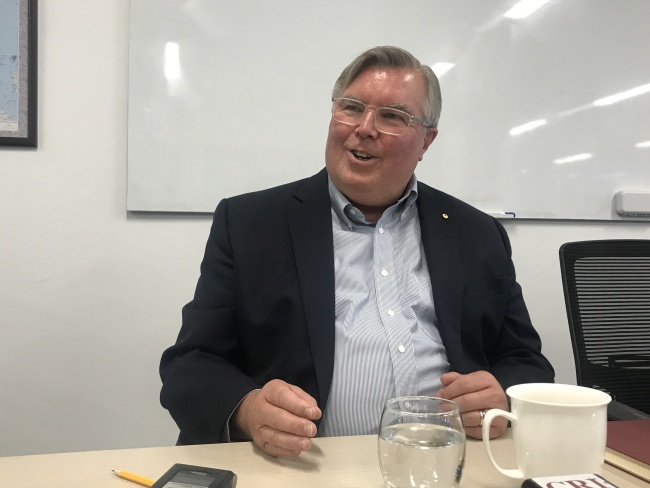(单词翻译:单击)
正文文本
Kevin's story with China started in 1983 when he moved to Beijing with his wife. As one of the first foreigners working in the capital city at that time, Kevin commuted by car every day along the Zhongguancun Street, from Youyi Hotel to Peking University.
He also ran a law firm in the downtown area. He said because the public transport system was still underdeveloped in Beijing during that time, he had to get around the city by car or bicycle.
"Sometimes I would ride my bicycle. Sometimes I would ride my car. But the car was necessary because after my classes at Peking University, I would drive downtown to work in my law firm. At that time, there was just one subway line there. So subway wasn't really an option. You have many more options today."
After spending four years in Beijing, Kevin went on to live in a number of cities across the world including San Francisco and Sydney. While he lived in other parts of the world, he still visited Zhongguancun Street a number of times and witnessed its transformation over those years. The street later developed into a technology hub of China and became notorious for traffic jams.
Now looking back at all these experiences in different societies, he says he realizes that it required a lot of vision and courage for the Chinese people to undertake the massive process of reform and opening-up.
He says people often neglected that when the Opening-up was first rolled out, there was no guarantee that the policy would be successful.
"And if you look at the opportunities for the Chinese people have increased over the years, the prosperity, the quality of health care, education, and the standard of living across the board. None of that was guaranteed 40 years ago when they open door. So it's a real tribute, I think, to the determination, the flexibility and the vision of the Chinese people that they've been able to accomplish that in a reasonably short period of time."

He said to achieve this, stability and strong leadership had to play a significant role.
"Well, I think that strong leadership and stability are critical elements. There's no doubt about that. I think that china has demonstrated. And if you look around the world and see countries where there is no stability, you can see that people struggle. If you have stability that is a building block for building prosperity and improving people's lifestyle. But I would say this is that the leadership has been strong, but it all has also been creative and flexible."
After he retired, Kevin put his focus on promoting people-to-people exchanges between China and Australia, which he said is one of the most fundamental ways to enhance relationships between the two sides.
He called for critical thinking and fairness when presenting China-related conversations in Australia, especially in the media.
"There's overwhelming interest in people to go from Australia to China to learn more about the real China. You know, the reality is the more we know each other, the less influenced we're going to be by incorrect or false information. Because you read something in the media, you see something on TV and you think, well, that just doesn't seem correct and that's what we want people to have. We want people to have a balanced, more comprehensive understanding of each country."
For CRI, this is Fei Fei.
参考译文
凯文与中国的故事始于1983年,当时他与妻子搬到北京生活。凯文是当时最早来到首都北京工作的外国人之一,他每天沿着中关村大街通勤,开车从友谊宾馆到北京大学。
他还在市中心经营一家律师事务所。他说,由于当时北京的公共交通系统并不发达,他出行只能开车或骑自行车。
“有时候我会骑自行车。有时我会开车。汽车是必需的,因为在北京大学上完课后,我会开车去位于市中心的律师事务所工作。当时那里只有一条地铁线。因此,地铁不能算出行选择。不过,现在有了更多的选择。”
在北京待了四年之后,凯文搬到世界其他城市生活,包括旧金山和悉尼。他在世界其他地方生活时,曾多次回到中关村大街,并见证了这条大街这些年来的转变。中关村大街后来发展成中国的技术中心,并因交通拥堵而饱受诟病。
现在,他回顾了在不同社会生活的所有经历,他说,他意识到,中国人民进行大规模的改革开放需要大量远见和勇气。
他说,人们常常忽略的一件事是,开放政策首次推出时,并不能保证该政策会取得成功。
“看看这些年来中国人民的机会,目前的繁荣,医疗保健的质量,教育水平以及整体生活水平都在得到提高。而在40年前中国打开大门时,这些都无法保证。因此,我认为这是对中国人民在相当短的时间内能够做到这一点的决心、灵活性和远见的真正致敬。”
他说,要实现这一目标,稳定和强有力的领导必须发挥重要作用。
“我认为强有力的领导和稳定是至关重要的因素。毫无疑问。我认为中国已经证明了这一点。如果环顾世界,就会看到在不稳定的国家,人们都活的很艰辛。稳定是促进繁荣和改善人民生活方式的基础。但我要说的是,领导层不仅强大,同时也富有创造力和灵活性。”
退休后,凯文将重点放在促进中澳之间的人文交流上,他说这是增进两国关系的最基本方法之一。
他在澳大利亚,特别是在媒体上发表与中国有关的对话时,要求辩证思考和公平。
“澳大利亚民众对到中国来了解真正的中国有浓厚的兴趣。现实是我们彼此了解得越多,受到错误或错误信息的影响就越小。因为你在媒体上阅读了一些内容,在电视上看到了一些内容,然后你会想,这似乎并不正确,这就是我们希望人们拥有的。我们希望人们对每个国家有一个平衡,更全面的了解。”
CRI新闻,菲菲(音译)报道。
重点讲解
重点讲解:
1. get around 到处旅行;游历;
I don't get around much any more.
我不再到处走动了。
2. a number of 若干;许多;
A number of houses were burnt down in the fire.
在火灾中,好些房子给烧毁了。
3. look back 追忆;回顾;
As I look back, scenes of the past leap before my eyes.
追忆往事,历历在目。
4. across the board 影响全体地;全面地;
The worker's wage was increased across the board.
工人的工资全面提高了。


